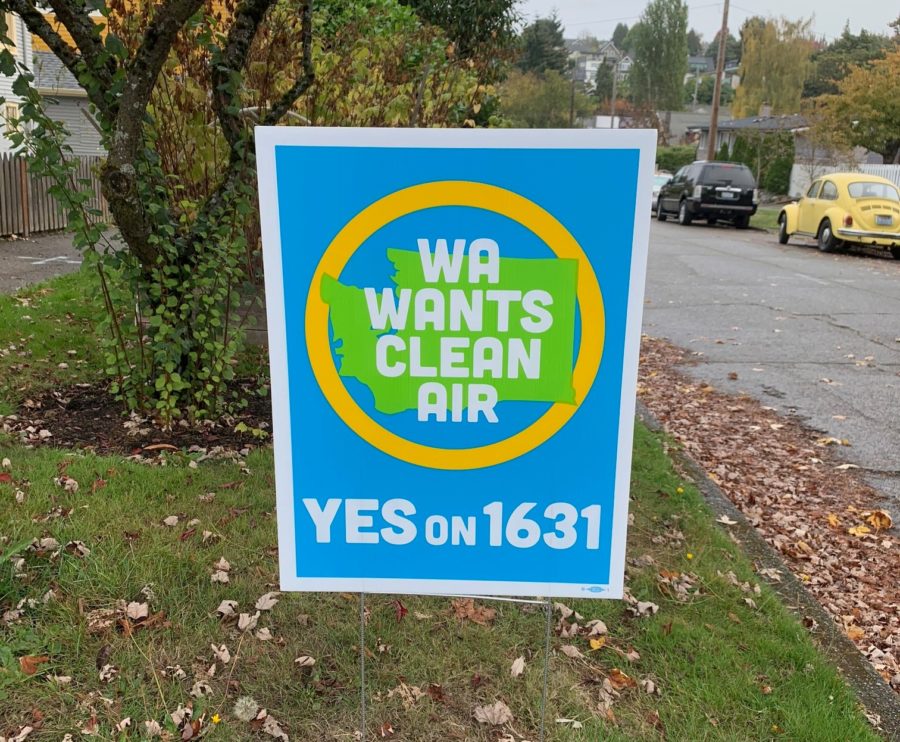Initiative 1631, which would have charged polluters and used the money for clean energy in Washington, did not pass. Similar efforts in recent years met the same fate. What are people in Washington to make of these results? How does voters’ stated support for climate action reconcile with their action on the ballot?
One answer is campaign money. Another is taxes and fees.
READ MORE: See how ballot measures on climate, social, and voting reforms did throughout Cascadia
I-1631’s demise may have more to do with the fact that Big Oil spent an eye-popping $31 million to defeat it, than with how voters feel about climate action. The fact that it would have raised fees didn’t help either. Let’s put I-1631 in the context of other ballot measures that would have raised taxes or fees, or threatened corporations. To no one’s surprise, initiatives that increase taxes or fees usually lose. And when Big Money steps in, it usually gets what it wants.
When corporations or wealthy people spend big to defeat Washington ballot measures, they often succeed.
Big money almost always wins
When corporations or wealthy people spend big to defeat Washington ballot measures, they often succeed.
- In 2013, Monsanto, Nestle, and other corporations raised more than $24 million to kill a Washington initiative requiring labeling of genetically modified (GMO) foods. They succeeded.
- In 2010, a few super-rich people ponied up more than $6 million to defeat an initiative establishing a state income tax. Although the “Yes” campaign was neck-and-neck on fundraising, the initiative lost.
- In 2010, wine and beer sellers raised nearly $9 million to defeat an initiative that would have raised taxes on liquor sales. The “Yes” campaign couldn’t match their fundraising and the initiative failed.
- This year, soda makers spent $20 million to prevent new taxes and won.
- In 2011, Costco and other big-box retailers raised a whopping $20 million to pass an initiative that would let them sell liquor while limiting their competition from smaller retailers and depriving the state of some revenue.
- In 2016, manufacturers raised more than $3 million to defeat I-732, a carbon tax. The “Yes” campaign raised less than $1.5 million and the initiative lost.
All of those examples look like small potatoes compared with the $31-million mountain that I-1631 faced. No initiative, no matter how popular with voters, has ever succeeded against so much cash.
Tax initiatives usually lose
Citizens’ initiatives in Washington that involve a tax (or fee) increase have lost three times out of four. From 1914 through 2017, only five Washington tax-increase initiatives won on the ballot. Two of those were tobacco taxes. Fifteen lost. Only the following tax-increase citizens’ initiatives won:
- A 1932 initiative to create a state income tax (on those who had incomes during the depression)
- A 1940 initiative to create an old age pension system
- A 1948 tobacco tax to creates a WWII veteran bonus
- A 1988 tax on hazardous substances to fund cleanup programs
- A 2001 tobacco tax to fund health programs
It’s a short and feel-good list. Any initiative would be proud to join its illustrious ranks.
People are turning to the ballot rather than to lawmakers
Not that long ago, Washington voters used the initiative process sparingly. Prior to 2000, it was common to see fewer than 15 initiatives filed in a year. Many times, they couldn’t even gather the signatures needed to be certified to the ballot.
For the past 18 years, it is common to see more than 50 initiatives filed—in 2016 there were a whopping 137. More groups are putting in the money and effort, with many years seeing three initiatives on the same ballot. In 2010, there were six.
The spike in initiatives suggests that the people of Washington increasingly feel that Olympia isn’t giving priority to constituents’ important issues.
Voters elect legislators to pass laws on their behalf. The initiative process is an alternate route for voters to take matters into their own hands when lawmakers don’t act on issues that are important to voters. The spike in initiatives suggests that the people of Washington increasingly feel that Olympia isn’t giving priority to constituents’ important issues of the day. They take to the ballot and… often get blocked by Big Money there, too.
Voters should have more choice and more voice
A solid majority of Washington voters want climate action. If they were able to elect lawmakers that reflected their views, the legislature would have passed meaningful climate policy long ago. One-quarter of climate pollution in the world is covered by a carbon price. All of those prices were put in place by legislatures.
Much of the climate action in the world is happening in countries that elect their legislators through proportional representation—they are quick to ratify international treaties and have pushed pollution down four times as fast as winner-take-all places like Washington (and most other North American states and provinces).
Initiatives brought by the people can provide an important safety valve for voters’ unmet needs and send a clear message from citizens to lawmakers. But they are no replacement for a responsive and accountable democracy.
Reformers could go back to Olympia for action on climate change while simultaneously working on making Olympia work better. Look to the north where British Columbians are voting right now on whether to reform their elections by joining the ranks of countries with modern, responsive democracies. If electoral reform wins in British Columbia, it might spread to Washington, giving advocates more chances to pass important legislation instead of duking it out against Big Money at the ballot.


Comments are closed.